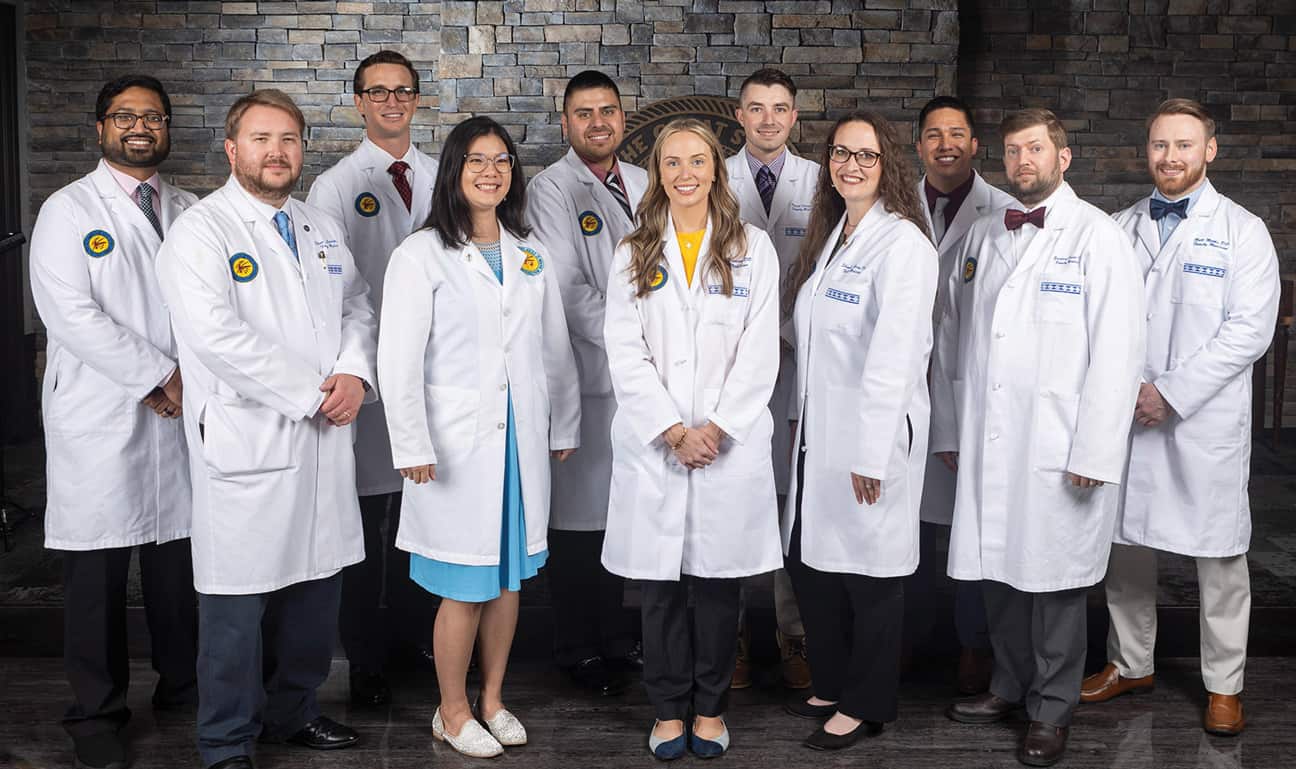
Choctaw Nation Family Medicine Residency program improving Oklahoma healthcare
Published February 1, 2023By Christian Chaney
The Choctaw Nation Family Medicine Residency program (CNFMR), located in Talihina, Oklahoma, has improved Oklahoma’s difficulties in recruiting and retaining physicians in rural areas. The ACGME-accredited program started in 2012 and has since made strides toward producing graduates to support the need of physicians in rural, underserved areas and improve health care in these regions. Those who enter the program are graduates of either a D.O. or M.D. program.
There are currently two medical schools in Oklahoma — The University of Oklahoma College of Medicine and Oklahoma State College of Osteopathic Medicine. Six current residents and nine graduate residents are OSU-COM alumni. To date, there have been two Choctaw tribal members and one non-Choctaw tribal member to graduate from the program.
Residency training takes place after completing medical school in a hospital or clinical setting for three years. This comprehensive training allows the trainee to acquire in-depth, hands-on training in specialized fields of medicine and become eligible for board certification in the specialty of Family Medicine.
Residents in the program obtain numerous certificates, including Basic Life Support (BLS), Advanced Cardiac Life Support (ACLS), Advanced Life Support in Obstetrics (ALSO), Neonatal Resuscitation Program (NRP) and Pediatric Advanced Life Support (PALS). An average work week for a trainee in the program is between 60 and 70 hours. Resident physicians spend each calendar month on various training services. The distinctive design of rotations provides residents with an expansive base of patient care experiences.
The core rotations at CNFMR include inpatient, outpatient, emergency room, pediatrics and obstetrics and gynecology. However, residents can partake in rotations in additional specialties through a tertiary care training hospital that shares an affiliation agreement with the program.
Since the program’s inception in 2012, it has seen exponential growth. RN Unit Manager, Angela Battles, highlighted some of the transformations she has witnessed since joining the program in 2017. “I have seen significant growth in both patient accessibility and staffing over the past five years.” said Battles. “In 2017, two LPNs and one ward clerk were the only staff to complement seven resident physicians.”
Since 2017, CNFMR has relocated to a larger facility in the Talihina Health Care Center, extended the number of residents from three to twelve and increased the number of patient visits to nearly 7,000 per year. “I have enjoyed the growth we have been fortunate enough to experience in staff, resident physicians, and, most importantly, patient accessibility,” Battles said. According to Battles, she is honored to participate in the program.
“It is a tremendous honor to be a part of a program providing excellent healthcare while honoring the cultural traditions and values that are so vital,” said Battles. “I truly feel the Choctaw Nation Family Medicine Residency Program exemplifies the values recognized by CNHSA, and I am proud to be a small part of providing amazing health services to the people we serve.”
CNFMR seeks trainees through recruitment who possess local, rural or tribal roots and intend to serve tribal members and rural communities upon completion of the program. On average, the program produces four rural primary care physicians each year.
According to Program Director Ashton Clayborn, D.O., 85% of graduates continue to serve in rural, medically underserved areas, and 70% continue to serve Choctaw Nation in various practice settings. Clayborn, D.O., says there are many reasons medical school graduates should choose CNFMR.
The program offers a supportive family atmosphere for residents and devotes itself to supplying tribal members and rural communities with qualified, well-trained physicians to meet their vast needs. CNFMR offers residents an attractive benefits package, competitive salary and on-campus family housing.
Clayborn, D.O., says housing is one of the most intriguing benefits, as it allows resident physicians to focus on their studies and alleviates some stress. Ashton Clayborn, D.O., is a product of CNFMR’s success. She is a program graduate and has continued to serve the Choctaw Nation and the state of Oklahoma proudly.
“As a previous graduate of the program, it has been an honor to give back in the role of Program Director and to be afforded the opportunity to enhance the education of physicians well-trained to meet the needs of the people we serve,” said Clayborn, D.O. Clayborn, D.O., is enthusiastic about the future of the program.
According to Clayborn, D.O., Choctaw Nation can expect “continued improvement in patient care, ongoing progress toward the most advanced and broad medical training in family medicine and continued focus on tribal and rural health outcomes for those served by graduates of the program.”
The future of healthcare is promising for tribal members and rural Oklahoma residents.